Top 20 Defensemen of Post-Orr Era
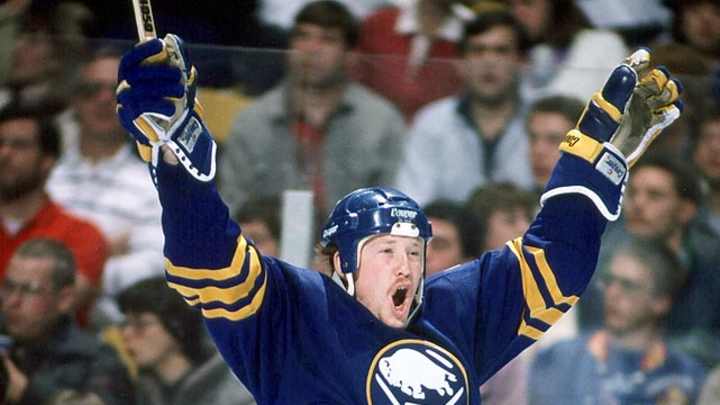
Top 20 Defensemen of Post-Orr Era
Phil Housley

<italics>SI's Brian Cazeneuve ranked the 20 best defensemen who played in the NHL since Bobby Orr made his enormous impact with the Boston Bruins between 1966 and '76:</italics> With 1,232 career points, Housley stands fourth all-time among NHL backliners. So why not rank him higher? His teams never went anywhere. Aside from one season (1997-98) when he was a third-pair defenseman with Washington, which reached the Stanley Cup Final, Housley's teams won exactly one playoff series, and that was during his rookie season with Buffalo in 1982-83. He was also -53 for his career, a mark for defensive liability that nobody else on this list even approaches.
Doug Wilson
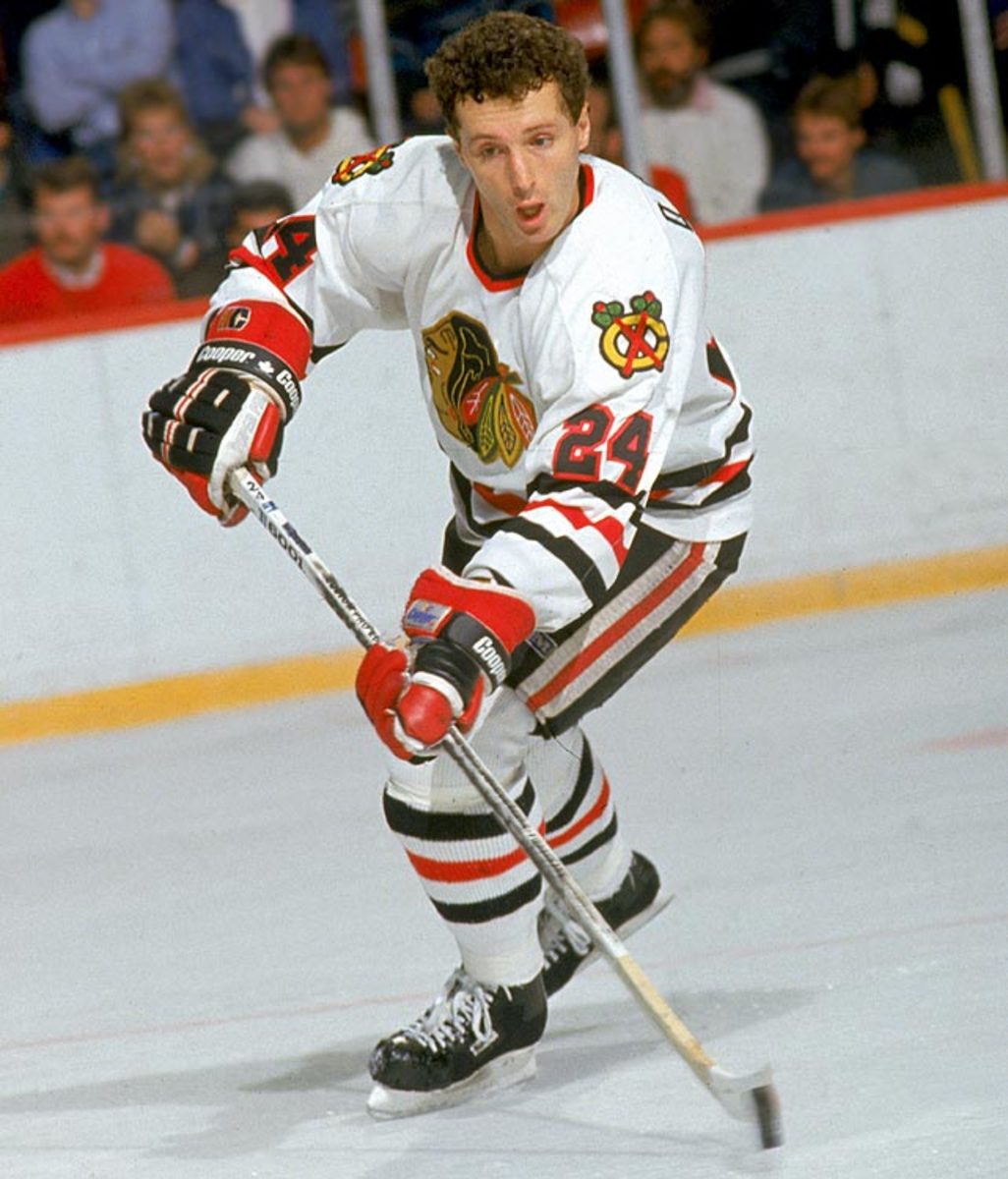
The San Jose Sharks' current general manager was a smooth-skating ace defenseman in his day, amassing 827 points in 1,024 games and earning a Norris Trophy in 1982, after a 39-goal season, plus two subsequent second-team All-Star selections during his days with the Blackhawks. He then became the Sharks' first captain during their inaugural season in 1991-92. Though he was the best player in the family, he never won a Stanley Cup, leaving him four short of his older brother, Murray, who played seven seasons for Montreal. -- <italics>Brian Cazeneuve</italics>
Shea Weber
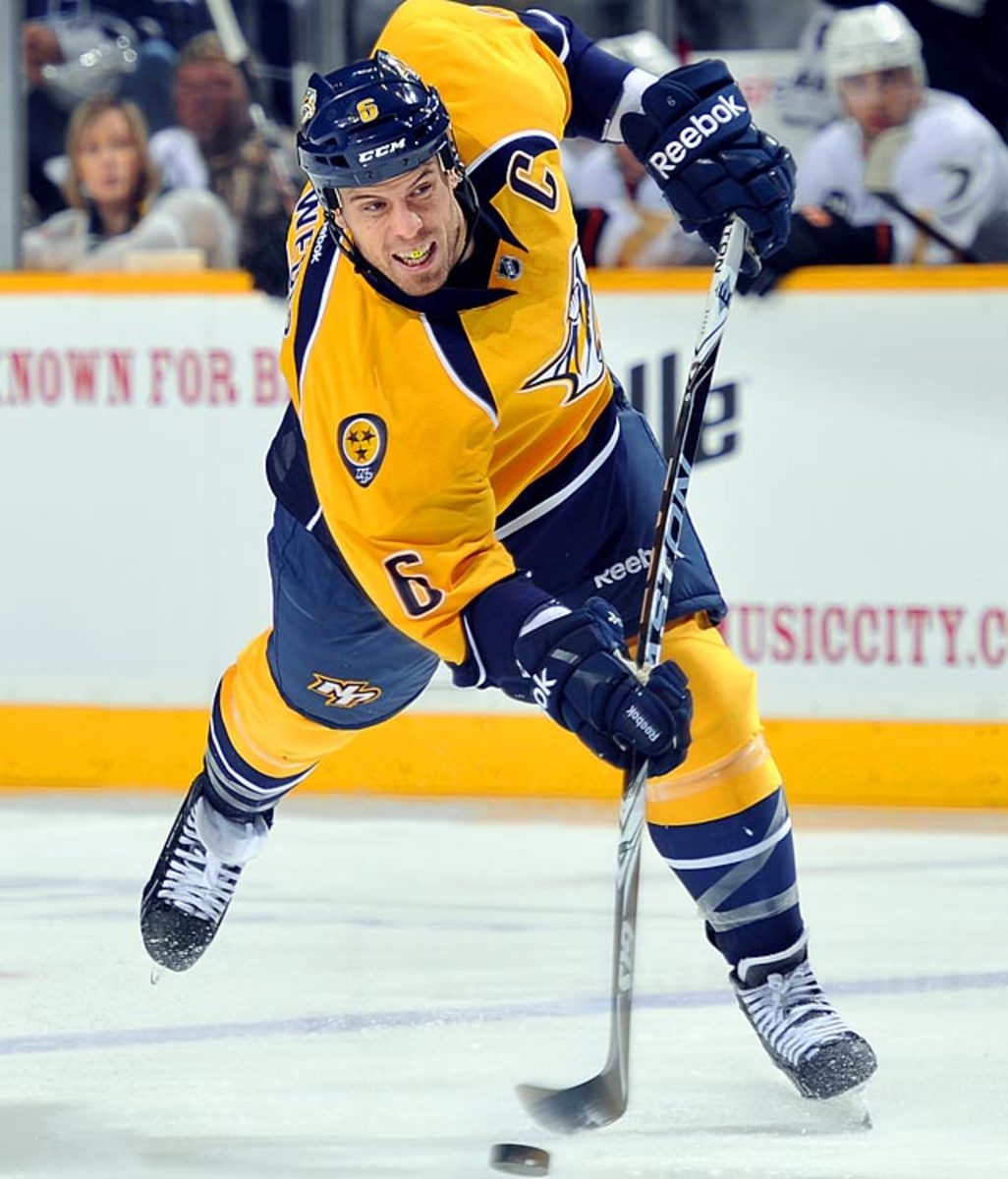
No wonder the Flyers wanted this guy so badly. Weber is a complete defenseman. At 6-4" and 235 pounds, he packs a mean streak and a cannonball shot. Though he's just 27, he already has five seasons of at least 16 goals on his resume and an Olympic gold medal won while playing for Canada at the 2010 Winter Games in Vancouver. Without Ryan Suter as his partner, Weber doesn't have nearly enough support these days to help Nashville chase the Stanley Cup, but he should win the Norris Trophy before long. Yet, his legacy rides on whether he can win championships. -- <italics>Brian Cazeneuve</italics>
Borje Salming
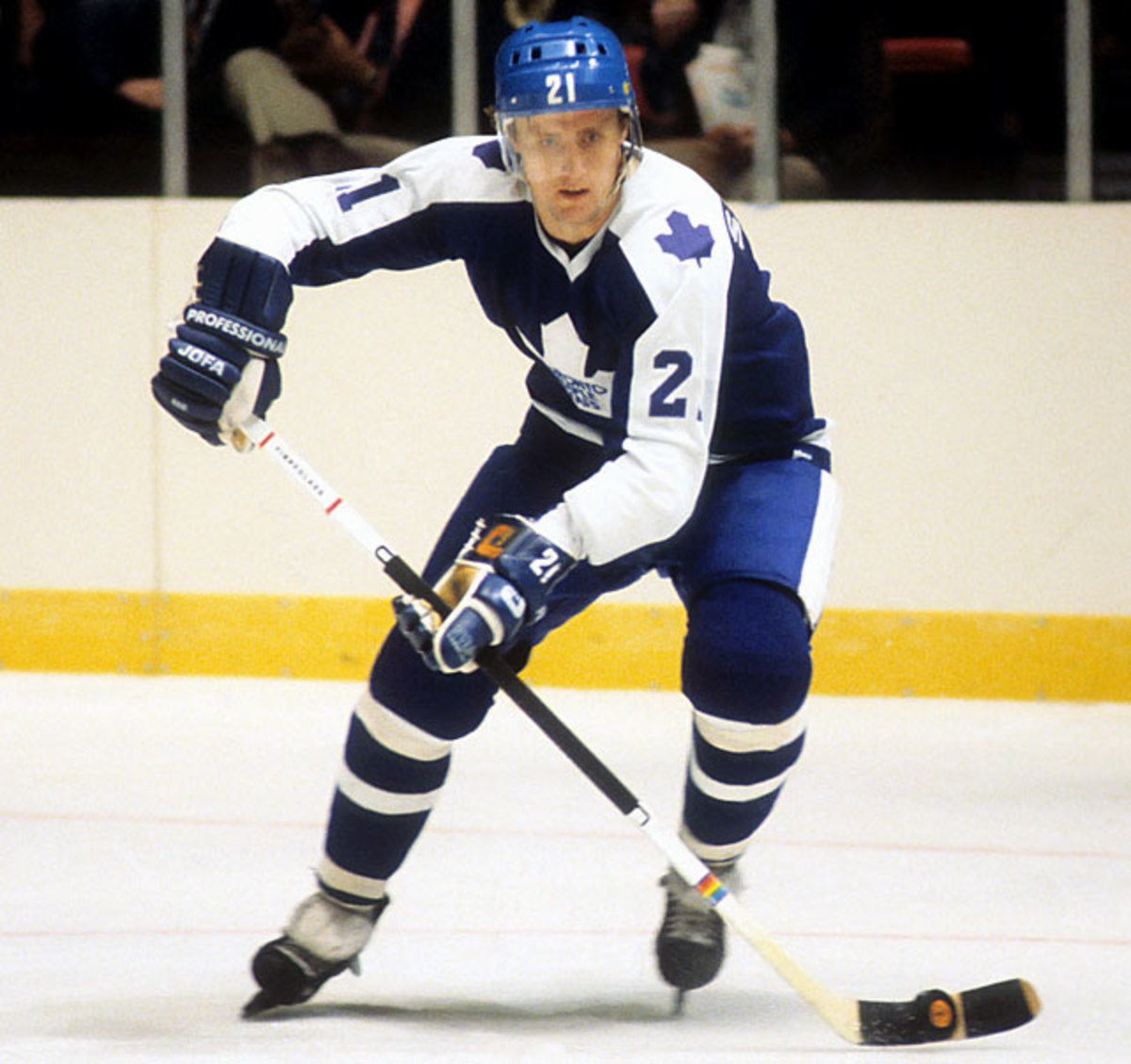
The longtime Maple Leaf came over to the NHL during the Broad Street Bully days when ruffians around the league ate Swedish hockey players for lunch or used them as firewood. Salming took some brutal hackings and beatings in his career, but he also won respect for playing through them and becoming a fine support player for the likes of Darryl Sittler and Lanny McDonald in Toronto. Salming earned five second-team All-Star selections and was a first-team pick in 1977. He finished his career with 787 points and a+175 rating in 1,148 games. -- <italics>Brian Cazeneuve</italics>
Rob Blake
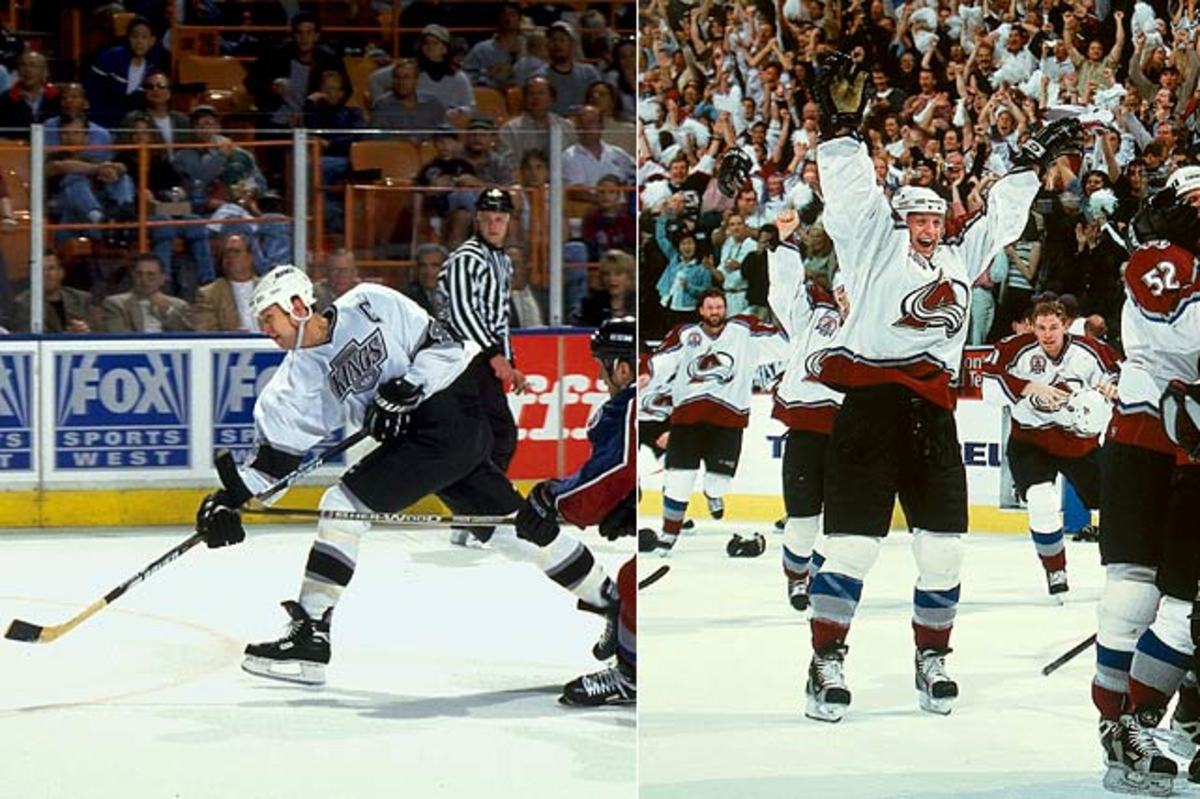
The classic two-way defenseman was a stiff body-checker and steady puck-mover who hit double figures in goals-scored 13 times during a career that spanned 1,270 games and produced a Stanley Cup in Colorado and gold medals at the World Championships and Olympic Games while representing Canada. Though he never had a 70-point season, Blake still amassed 777 points, a testament to his consistent production throughout his career. He also won the Norris Trophy in 1998 as a Los Angeles King. -- <italics>Brian Cazeneuve</italics>
Zdeno Chara
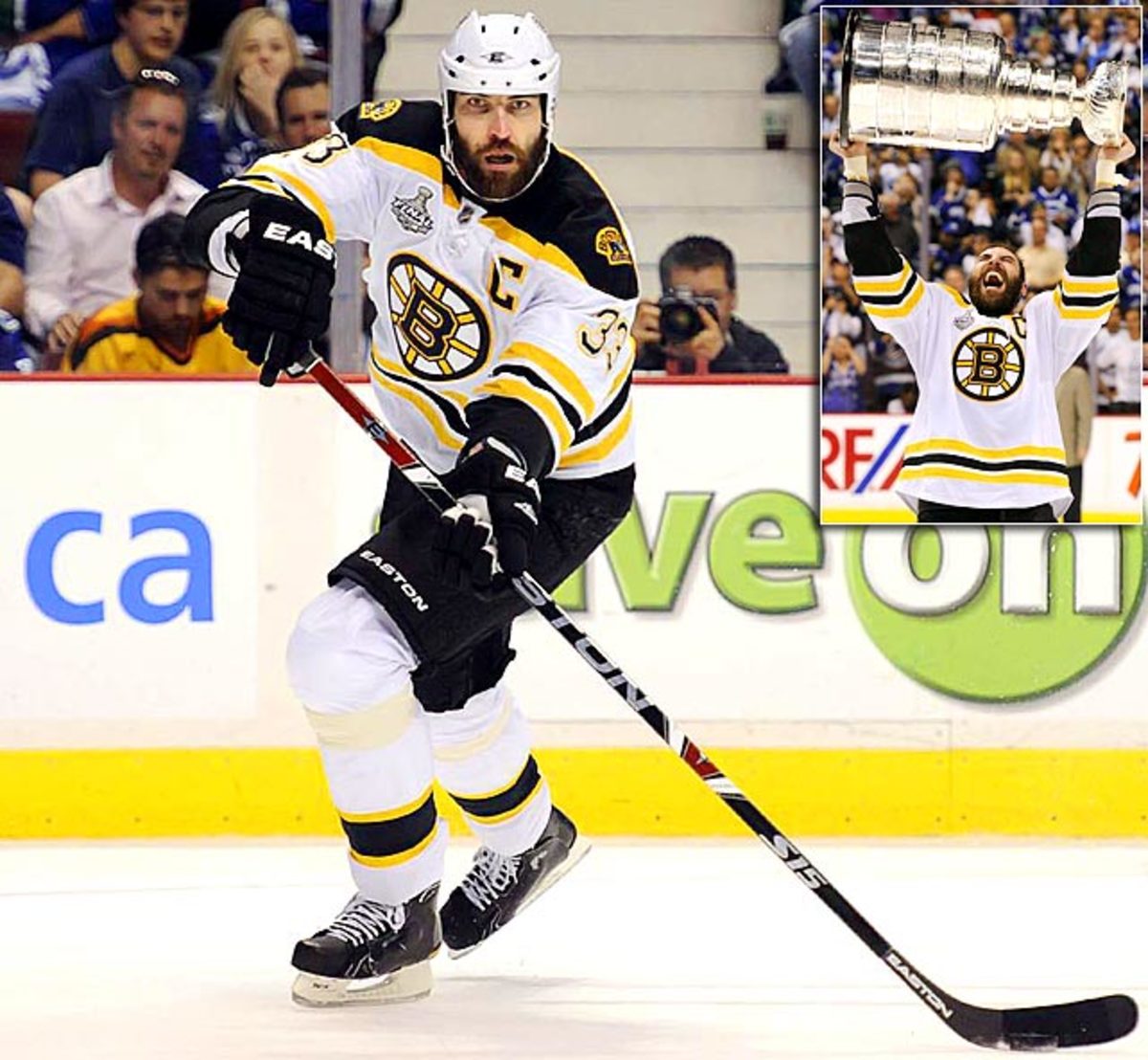
At 6'9", Big Z is the tallest NHL player ever and he has remarkable dexterity and puck control for someone who towers over the league. Even at 36, the 15-year NHL veteran is still a scary foe to play against. Though he will always remembered for his scary turnbuckle check of Montreal's Max Pacioretty in 2011, Chara is actually fairly controlled for the physical force he has been throughout his career, even with more than 1,500 penalty minutes in over 1,000 games-played. His crowning achievement: leading the Bruins with his brilliant play during the 2011 postseason as Boston ended its 39-year Stanley Cup drought. -- <italics>Brian Cazeneuve</italics>
Scott Niedermayer
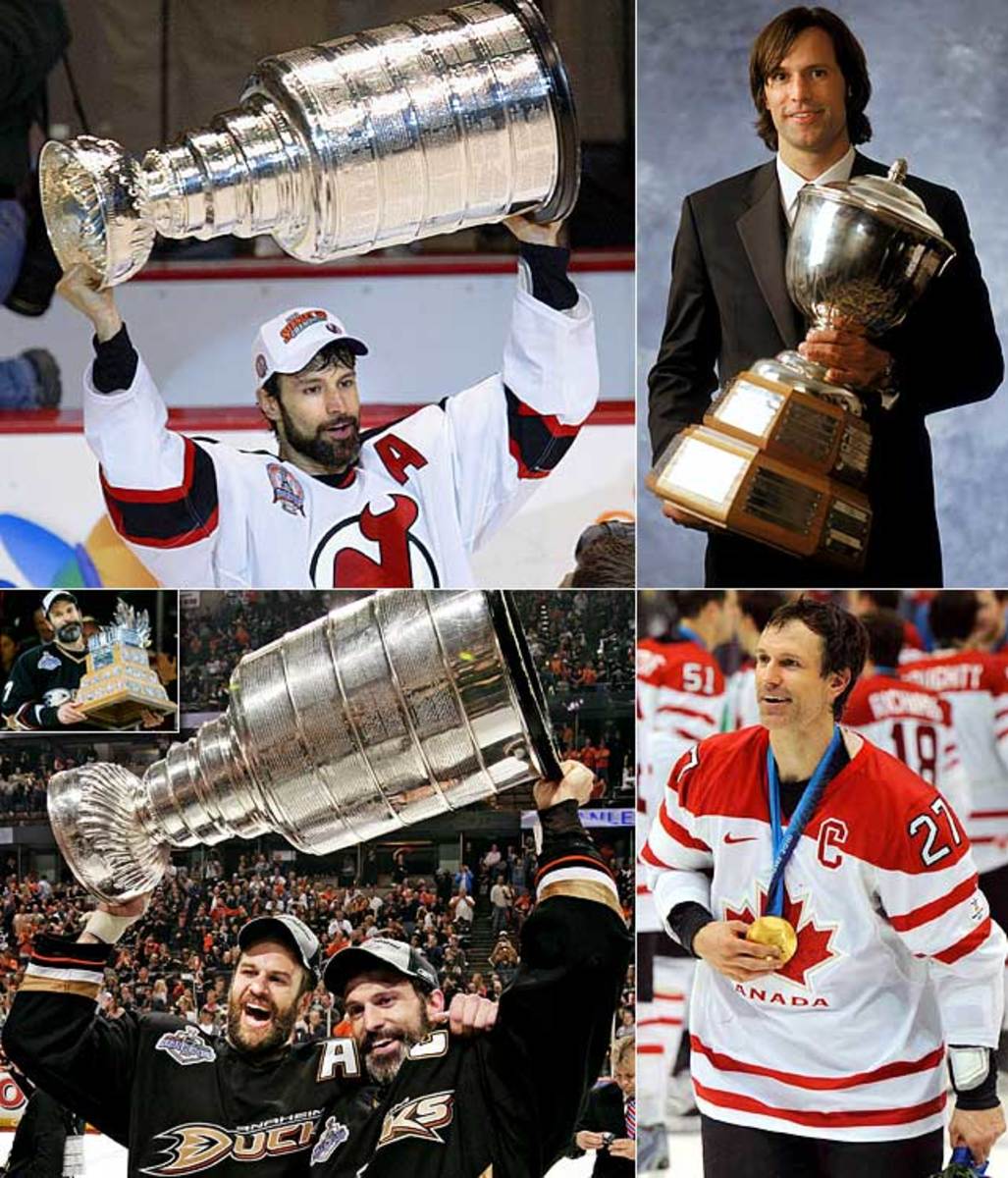
Imagine what might have happened had the swift-skating Niedermayer been able to change places with Paul Coffey. It's one thing to run up a zillion points in an offensive-minded era while playing for an scoring juggernaut like Coffey's Oilers, but Niedermayer was able to produce in an age of clutch-and-grab on a team that practically placed a do-not-pass-go sign around its defensemen's necks once they reached the opposing blueline. Under New Jersey's restrictive system, Niedermayer still shined, winning the Norris Trophy in 2004 and three Cups before earning the Conn Smythe Trophy while adding another championship while playing with his younger brother, Rob, in Anaheim in 2007. -- <italics>Brian Cazeneuve</italics>
Mark Howe
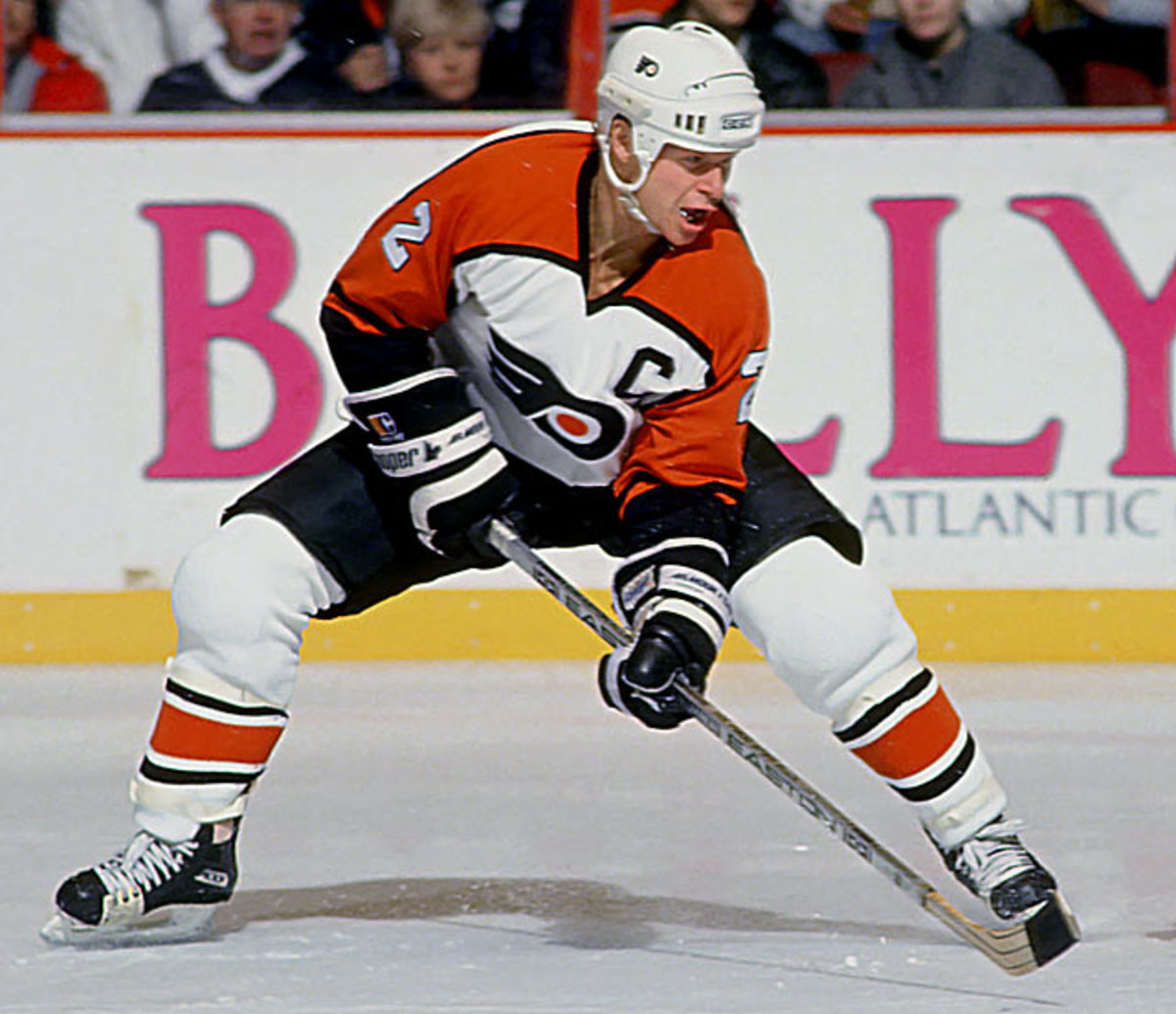
Though he was nothing like his legendary father, Gordie, Mark carved a niche for himself while playing a different position and bearing none of his dad's mean streak. The three-time Norris Trophy finalist never won the award, and Howe could also have been a fine candidate for the Lady Byng, an unusual distinction for a defenseman of merit, or for the Masterton Trophy, having survived a gruesome injury suffered when the plate that was used to keep the goal net firmly on the ice was jammed five inches into his hip. While teamed with defense partner Brad McCrimmon on the Flyers for much of the '80s, Howe once played an astounding 30 straight games without being on the ice for an even-strength goal against his team. -- <italics>Brian Cazeneuve</italics>
Rod Langway
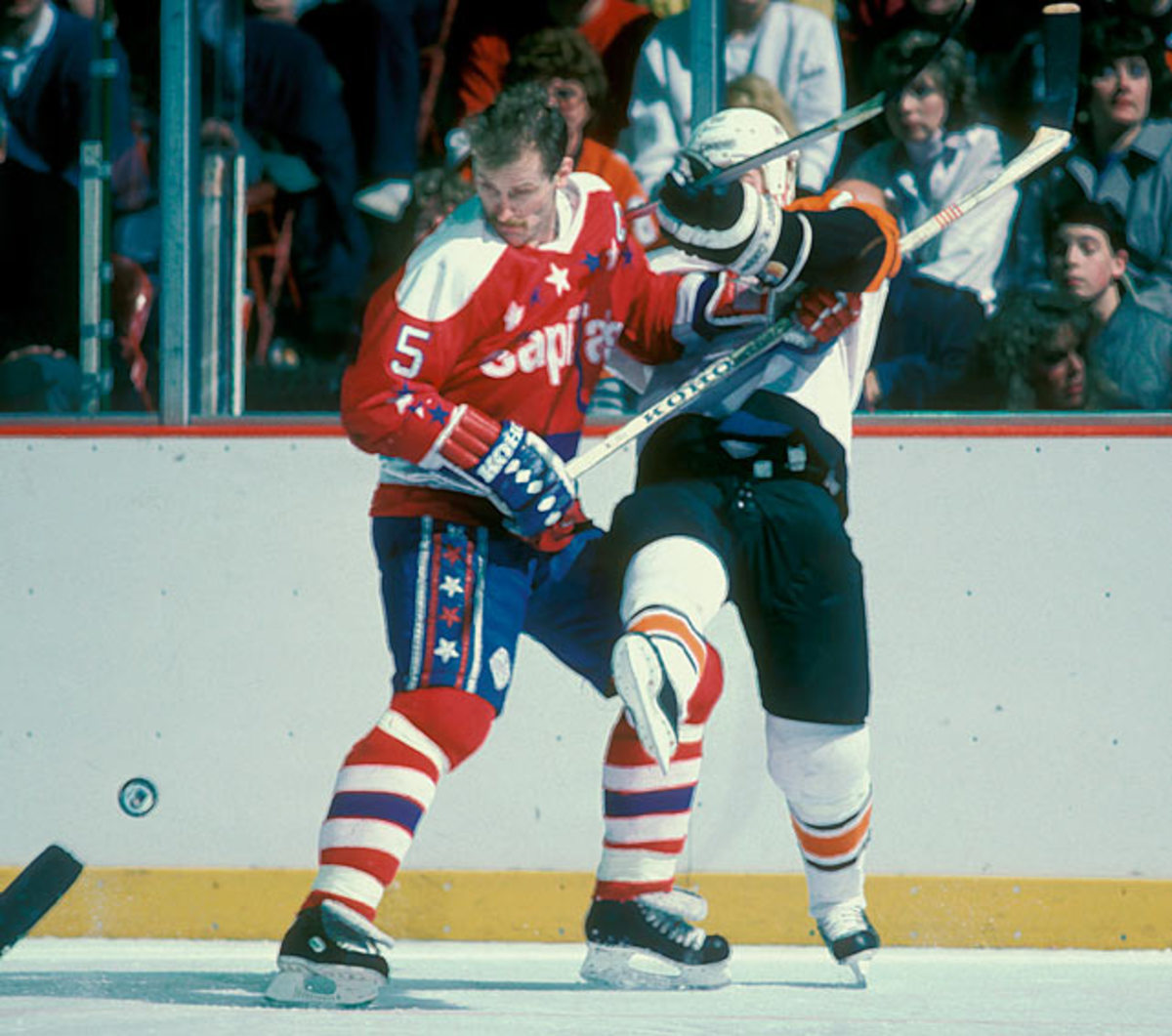
The anti-Paul Coffey, Langway made the Hall of Fame purely on his defensive skills, which were considerable. The two-time Norris winner was never especially fast, but always seemed to cover more ice than his skates seemed to allow, because of his tenacious play along the boards and relentless pursuit of pucks and opposing forwards. Langway played the game with an attitude and was effective at keeping his crease clear when there were fewer rules to govern that thankless task. He won the Stanley Cup in 1979 with Montreal, then became a force in Washington, where his teams only advanced past the second round once, a shortcoming that keeps him from a higher ranking here. -- <italics>Brian Cazeneuve</italics>
Larry Murphy
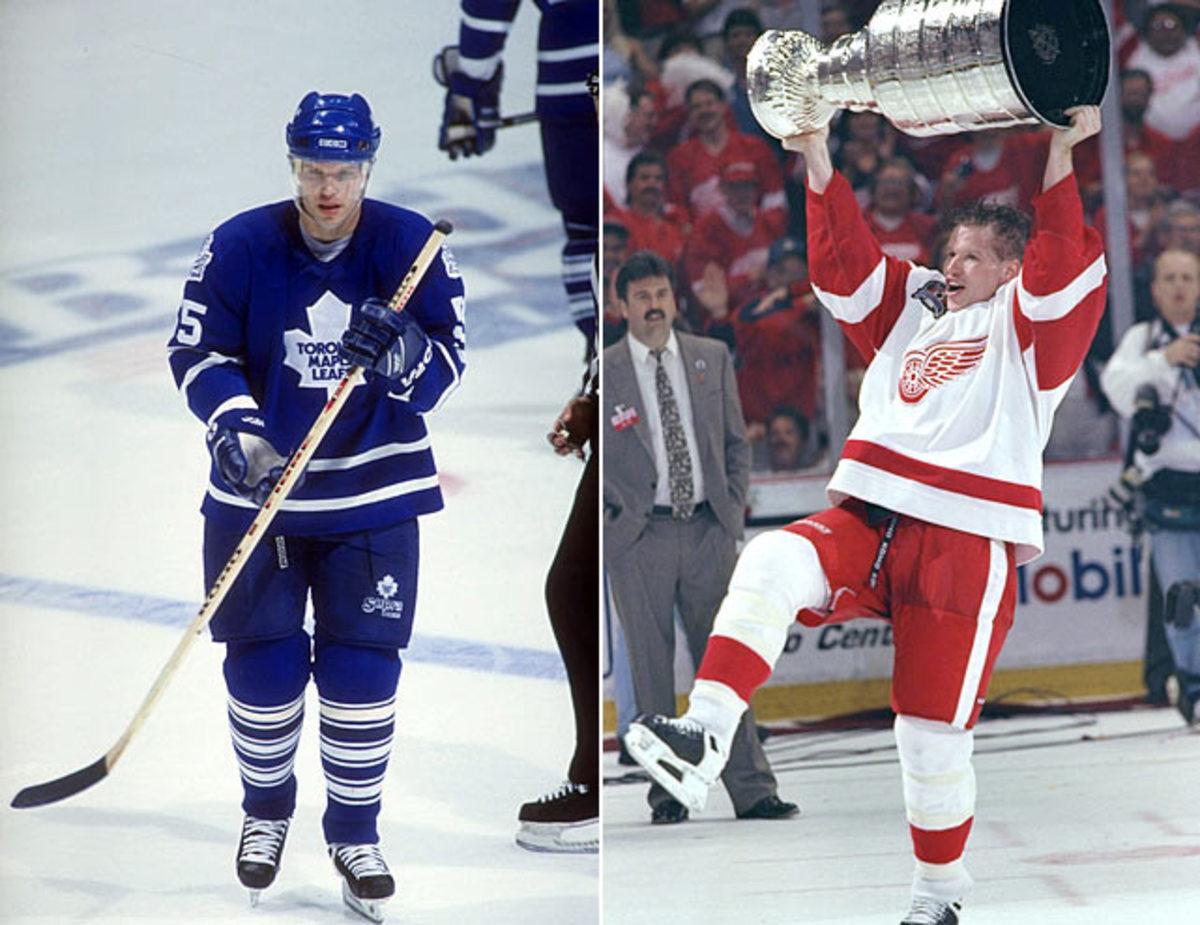
The Rodney Dangerfield of backliners was never truly appreciated for how durable (1,615 games), consistent (1,216 points), and successful (enough to play in 215 playoff contests) he was. Though Murphy became an offensive star in Washington and won a pair of Cups in both Pittsburgh and Detroit, he also endured a brutal two years in Toronto, where Leafs fans mercilessly and unfairly made him a whipping boy for the club's various woes. With the Red Wings, Murphy was a fine complement to Nick Lidstrom as a modest team player who adapted his game to fit the role he would play so well. -- <italics>Brian Cazeneuve</italics>
Al MacInnis
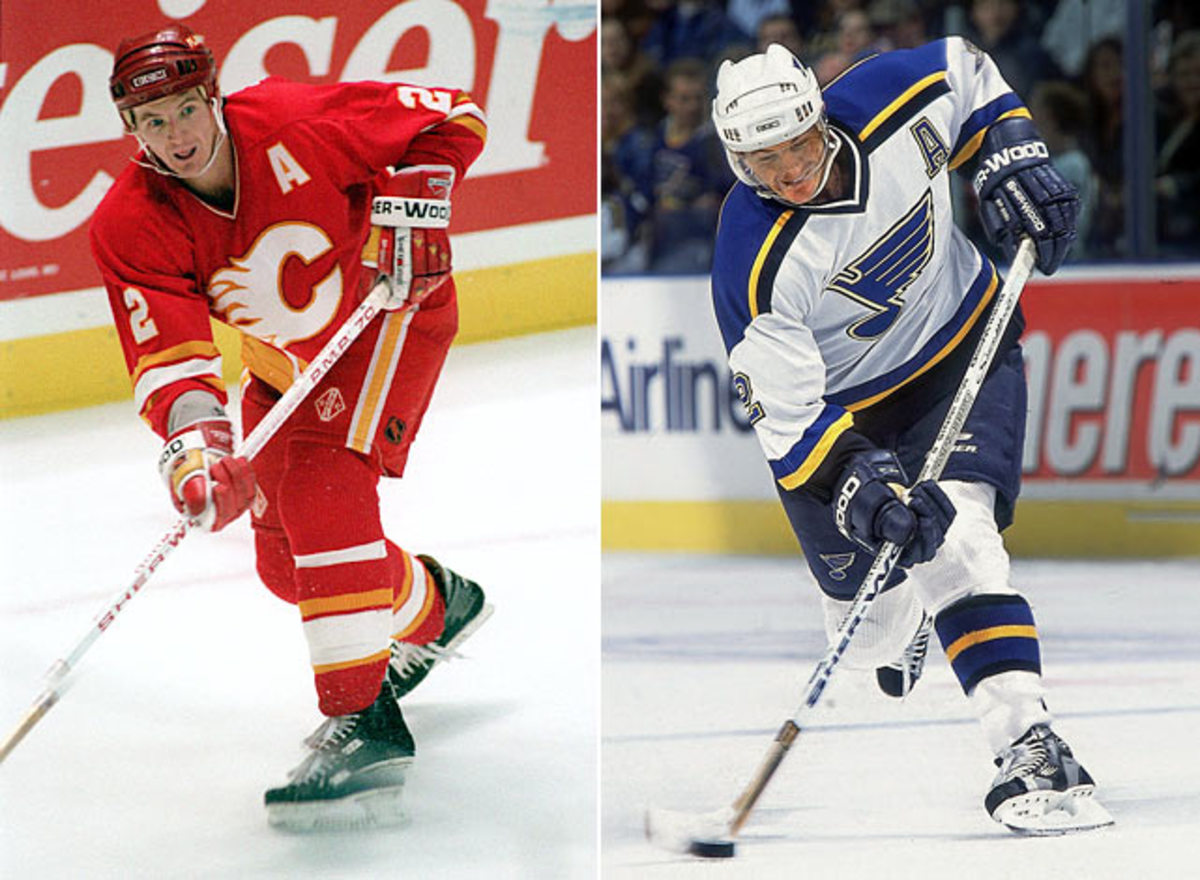
Though the radar gun sometimes backed him up, MacInnis may have had the most devastating shot in the history of the game. He unleashed the hardest slapper at three All-Star Games, but was able to keep his in-game shots low and he controlled them enough to slow them down so his teammates could tip them. He was also able to blow a shot past any goalie if there was no screen available. His slapper grew into legend after a game in 1984 when he fired a puck that split the mask of goalie Mike Liut into two pieces before bouncing into the net. Skilled at joining rushes and keeping pucks out of traffic areas in front of his net, MacInnis was a Cup-winner in 1989 with Calgary, and he finished his career with 1,274 points. -- <italics>Brian Cazeneuve</italics>
Paul Coffey
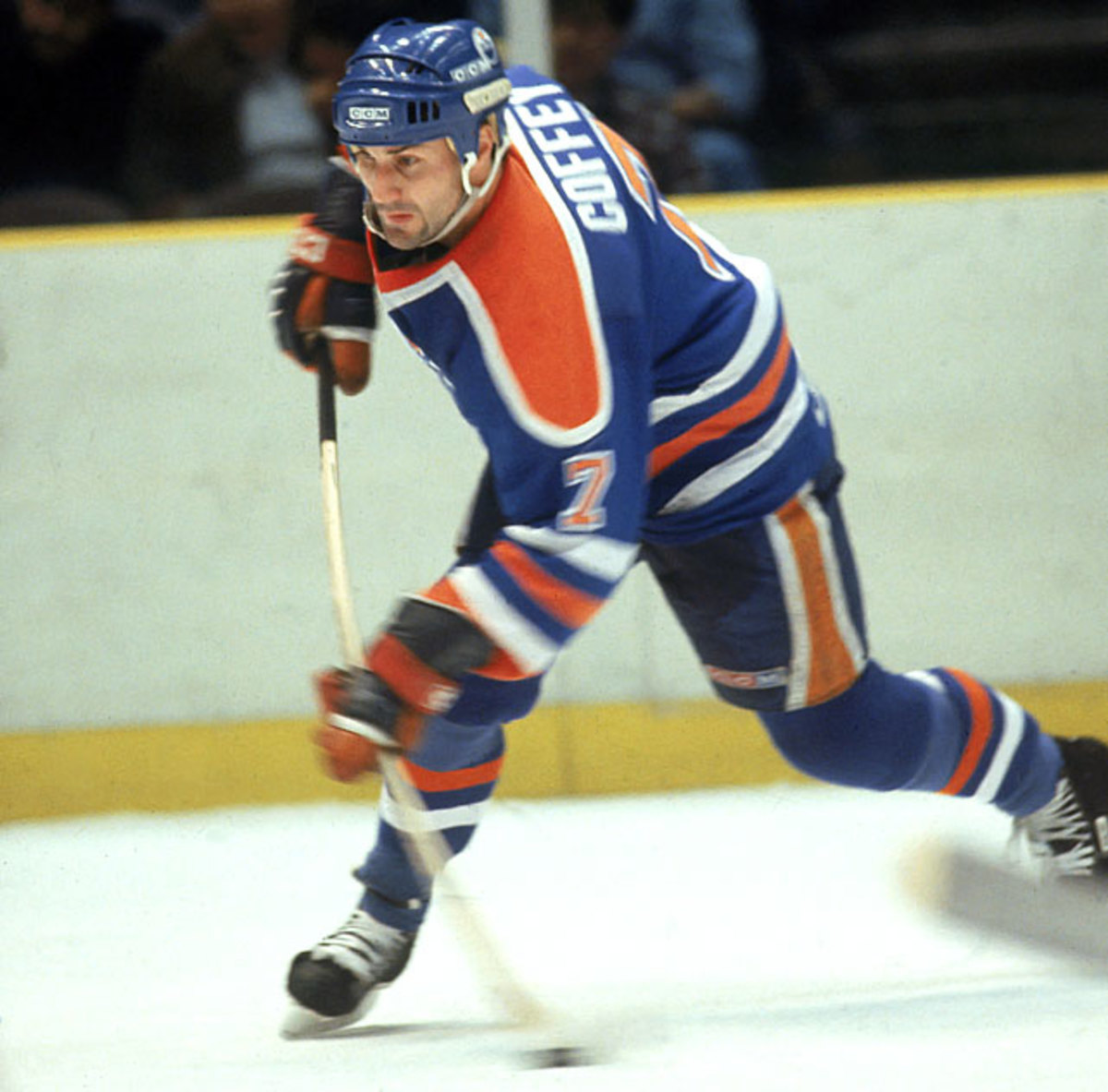
No defenseman since Orr has been as gifted as Coffey, one of the smoothest skaters to play any position on a hockey rink. With the run-and-gun Oilers, Coffey was deadly on the power play or when joining Edmonton's rush as a fourth man, a stealth trailer who feasted on leftovers produced by the likes of Wayne Gretzky, Mark Messier, Jari Kurri and Glenn Anderson. After winning three Cups in Edmonton, where he scored 48 goals in 1985-86, Coffey added another with Mario Lemieux and the Penguins in 1991, making him one of the fortunate few to ride shotgun with both 99 and 66 during their heydays. In fairness, Coffey's defensive shortcomings, especially noticeable in his later years, keep him from a higher ranking here.-- <italics>Brian Cazeneuve</italics>
Scott Stevens
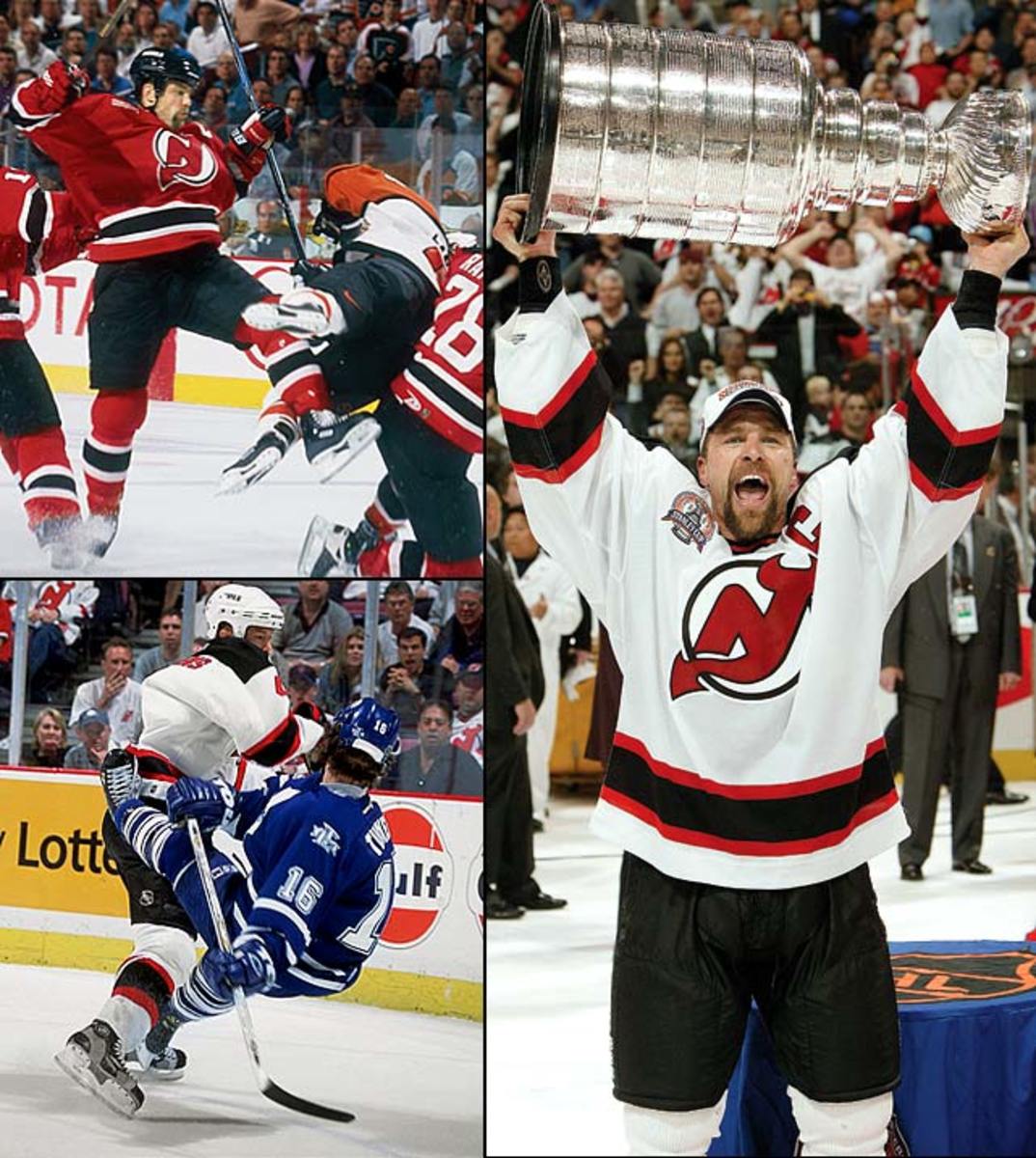
Arguably the most devastating body-checker in the history of the game, Stevens threw his fabled shoulders into Slava Kozlov, Paul Kariya and Ron Francis, knocking each of them senseless with hits that would likely get him hearings with Brendan Shanahan today. His most notorious knockout was a crunching hit on the much larger Eric Lindros in the 2000 playoffs when the Devils upset the favored Flyers. A plus player in each of his 22 seasons, Stevens was more than adequate offensively (908 points) and he captained New Jersey to the Stanley Cup in 1995, 2000 and 2003. He was an ideal fit on a gritty team that didn't win pretty and didn't apologize for failing to do so. -- <italics>Brian Cazeneuve</italics>
Chris Pronger
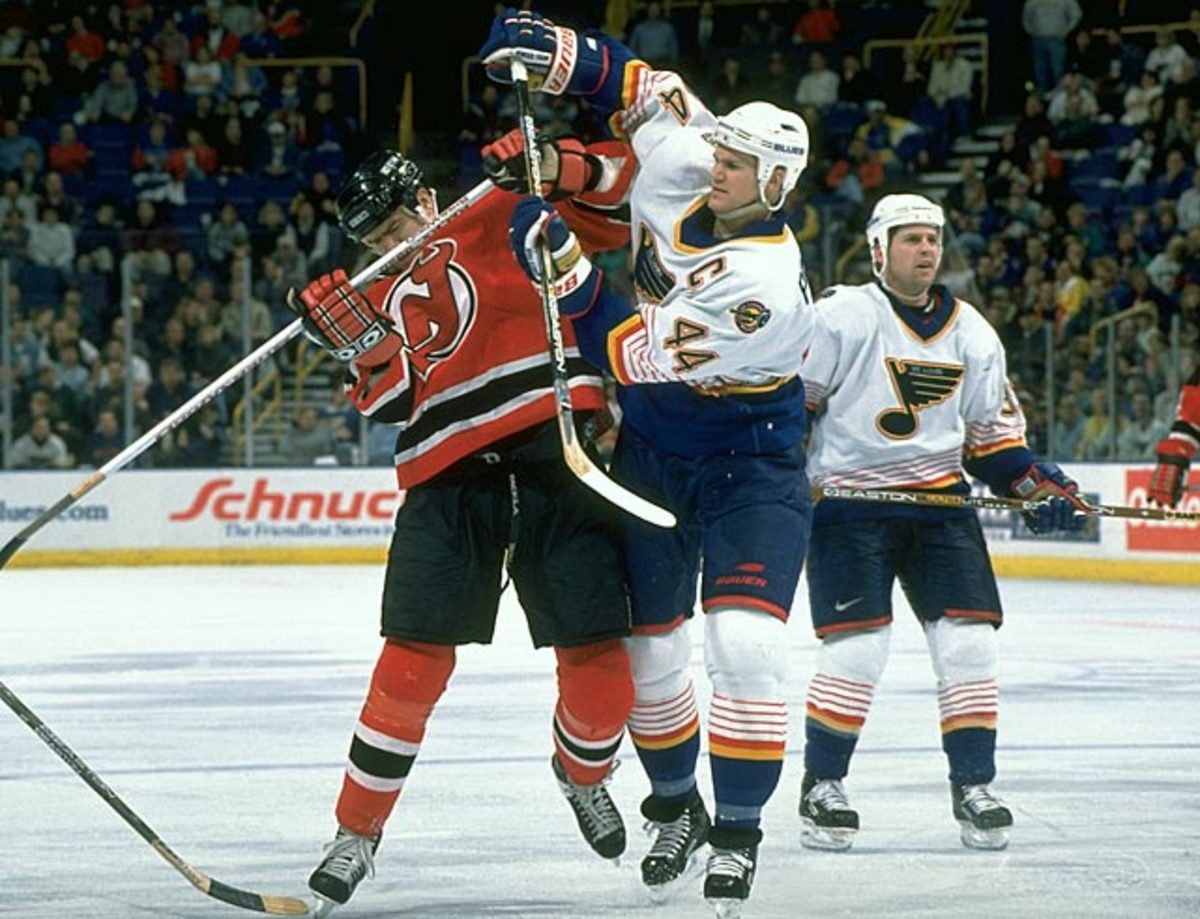
The subject of my SI feature was one of the meanest, most feared defenseman of his time and perhaps nobody who fit that description had the type of skills that Pronger did. Sure, he won himself a lot of room by earning eight suspensions for excessively physical play, but he also had superb vision and anticipation, making him a deft outlet passer and a defender who could afford to guess and take chances while playing aggressively. Having won the 2000 Hart (MVP) and Norris trophies (with also-ran St. Louis), and reached the Cup final with three teams -- he won the championship with Anaheim in 2007 -- Pronger is likely done as he battles the lingering effects of head injuries. Watch him talk about his ordeal in this exclusive SI video. -- <italics>Brian Cazeneuve</italics>
Brian Leetch
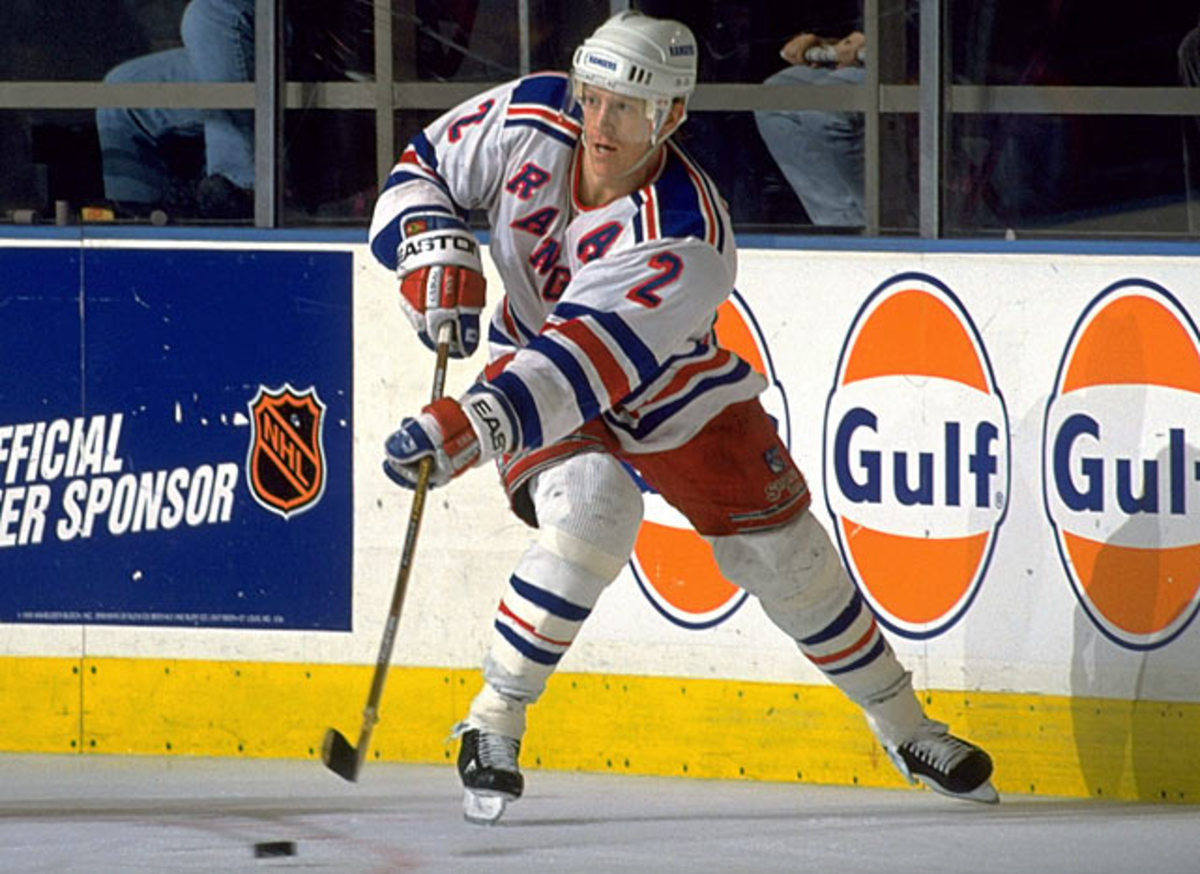
Perhaps the finest U.S.-born defenseman of all time, Leetch was a grab bag of skills, though he lacked Paul Coffey's speed and Al MacInnis' shot. He had a knack for keeping pucks in at the point, making plays in traffic, riding bigger players off the puck in his own zone, and creating scoring chances out of broken plays as well as anyone of his era. Remember his spin-o-rama goal in Game 7 of the Eastern Conference Final against New Jersey in 1994? Leetch won the Conn Smythe Trophy that year as playoff MVP and always saved his best play for pressure games, but he was too quiet and tame to follow in Mark Messier's footsteps as Ranger captain. -- <italics>Brian Cazeneuve</italics>
Chris Chelios
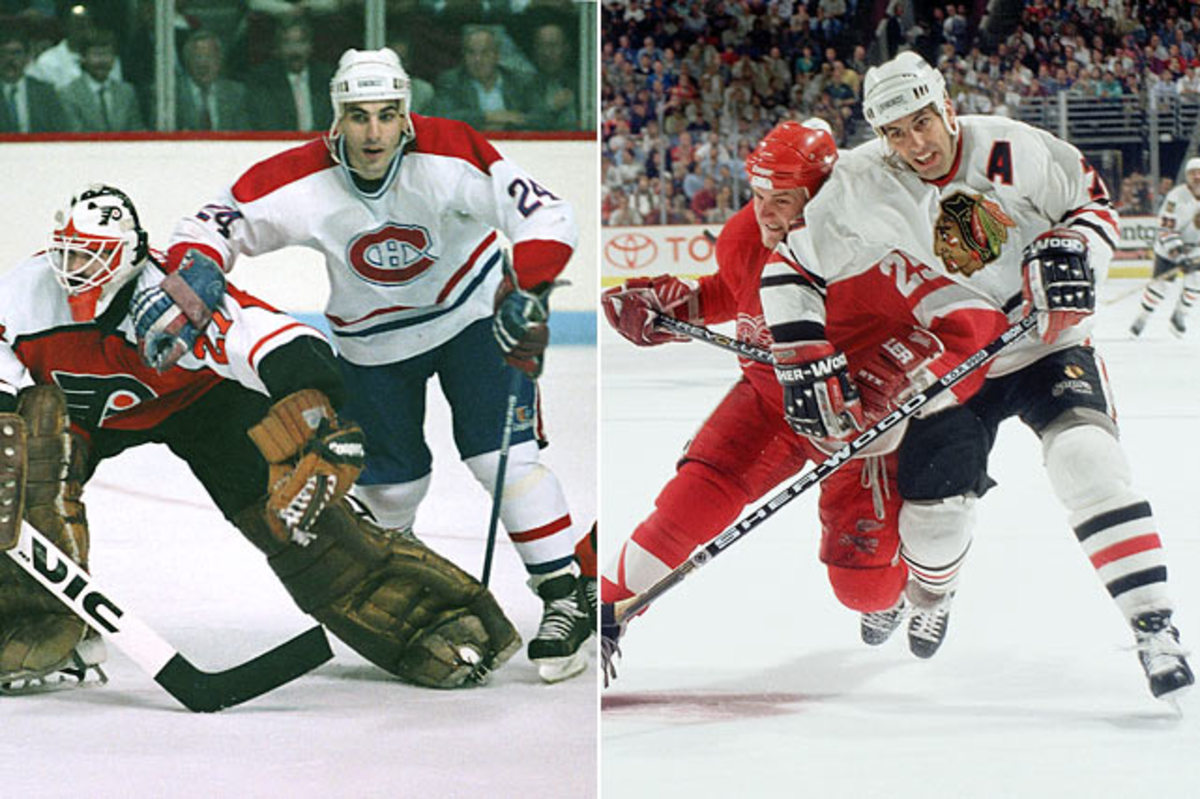
Nobody was more ill-tempered (his 2,891 penalty minutes, second all-time among NHL defensemen, were well earned) or inspired more animosity. Flyers' goalie Ron Hextall once compromised a Philly comeback in the closing minutes of a playoff game in order to chase Chelios down and pound away with some whacks and slugs. And maybe nobody loved the game more or worked harder for their minutes. Chelios played to age 48 and only retired because it was clear that his seven-game stint with the Thrashers in 2010 wouldn't lead to another season. His 1,651 games-played rank fifth all-time and are the most of any defenseman. -- <italics>Brian Cazeneuve</italics>
Larry Robinson
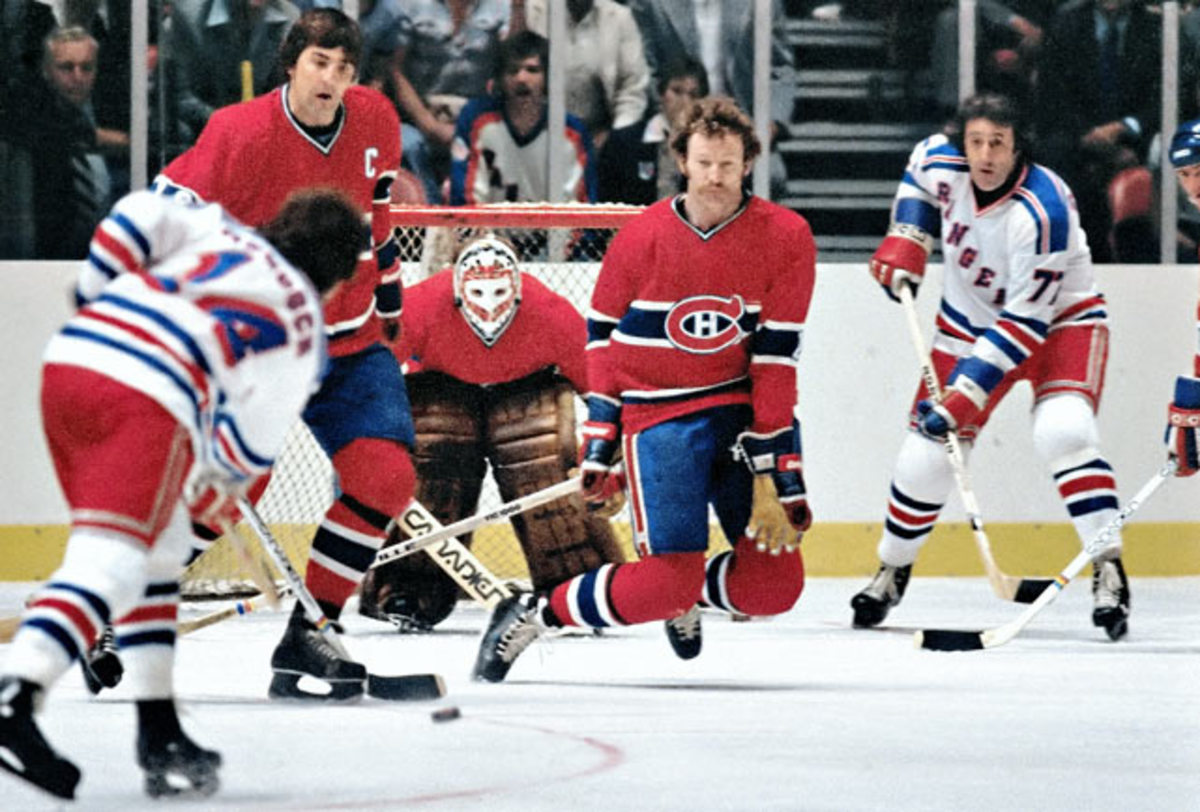
A giant in his day, the 6-4" Robinson was the ace of the defense corps in Montreal, where the Canadiens captured four straight Stanley Cups from 1976 to 79. Like Denis Potvin, his career overlapped with Bobby Orr's, but he enjoyed his finest days later. Robinson combined the offensive skills of backline partner Guy Lapointe and the defensive stinginess of Serge Savard, and his long reach made him tough to elude one-on-one. He fought enough in his younger days that he didn't haven't to do it much later in his career, and he caught a second wind when he won his sixth Cup in 1986. He finished his career with the highest plus-minus rating (+730) in NHL history and later won yet another Cup as coach of the Devils in 2000. -- <italics>Brian Cazeneuve</italics>
Denis Potvin
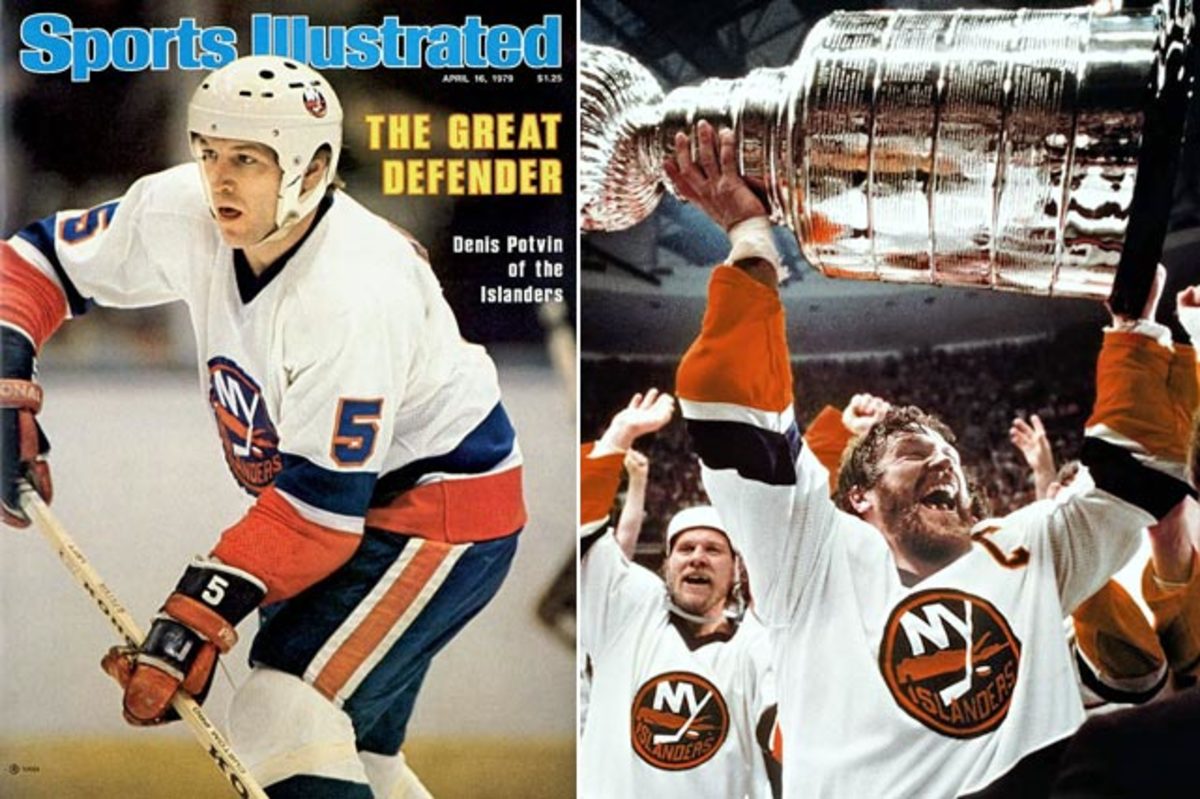
The Calder Trophy winner in 1974, Potvin's career overlapped with Bobby Orr's, but his heyday came as captain of the Islanders during their four consecutive Stanley Cups from 1980-83. The three-time Norris winner was an offensive force (310 goals and 1,052 points) as well as a rugged and -- some would say dirty -- body-checker whose name still rings from the rafters of Madison Square Garden as fans of the rival Rangers invoke his memory with a vitriol reserved for few retired players of any sport in any building. If you've been there and you hear the whistle, you know what's coming. -- <italics>Brian Cazeneuve</italics>
Nicklas Lidstrom
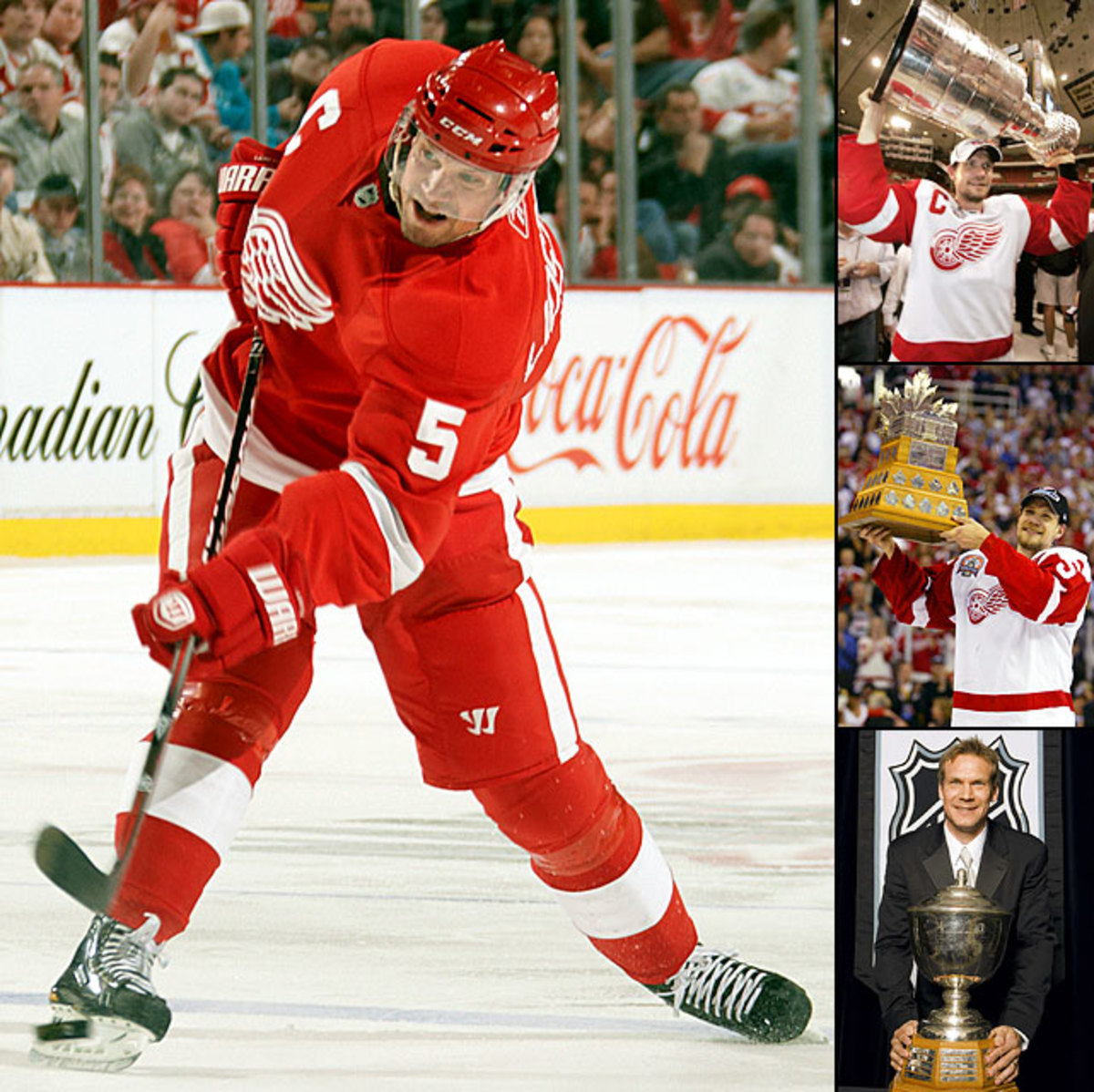
The 20-year Red Wing -- his teams reached the playoffs each season of his career -- was called the perfect hockey player, a testament to his offensive wizardry, defensive subtlety, overall acumen and gentlemanly play. More than anything, Lidstrom, a four-time Stanley Cup winner with 1,142 career points and seven Norris Trophies, was perhaps the least likely superstar to make a gratuitous error or costly play. He would go weeks without a goof that looked like a real mistake and while not as physical or as fast as other defensemen, he could get himself into a proper position as if directed by a handle in a table-hockey set. -- <italics>Brian Cazeneuve</italics>
Ray Bourque
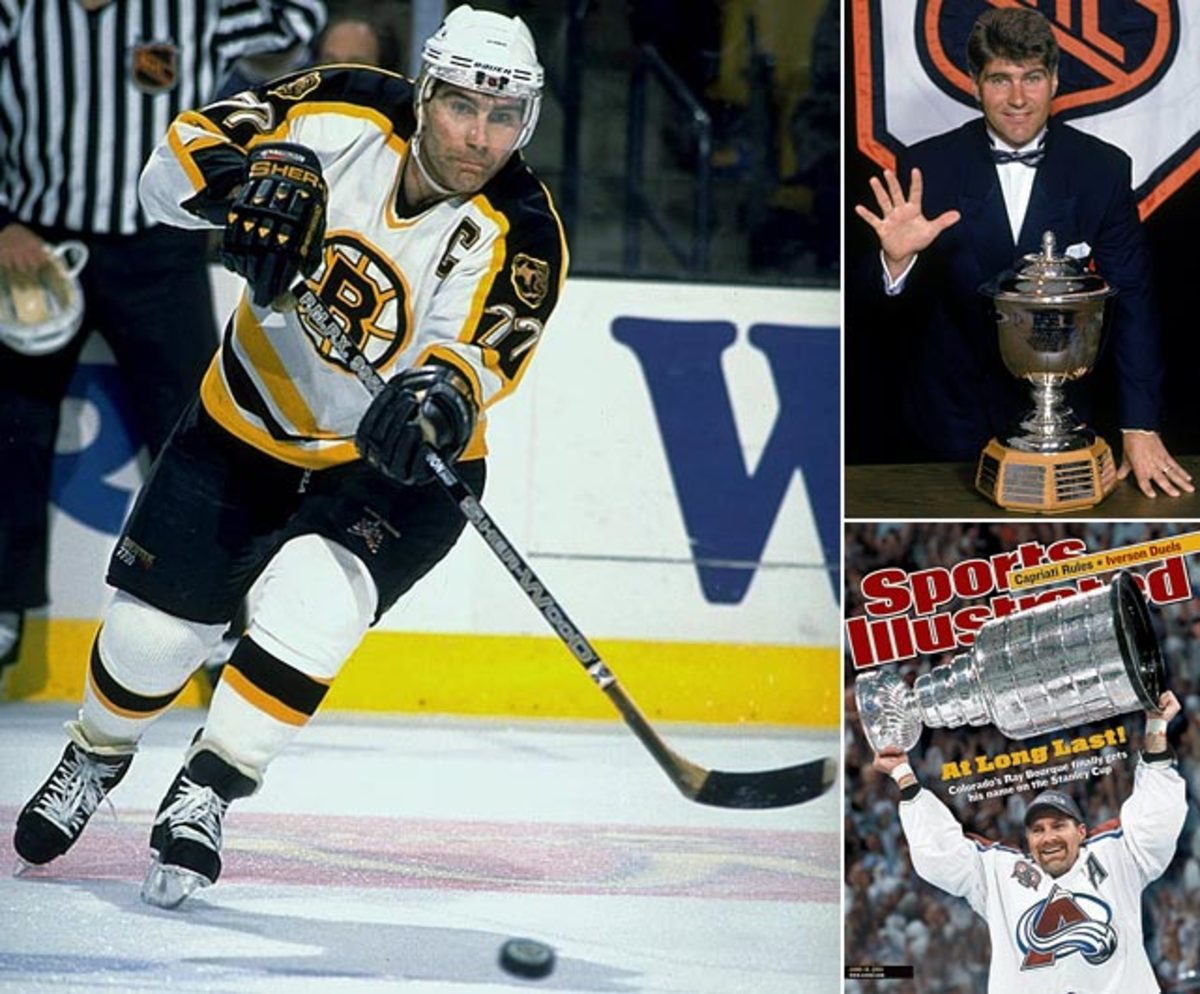
Perhaps no player's dance with the Stanley Cup was met with as much joy as Bourque's celebrating during his final game with the Avalanche in 2001. Hoo-Ray read an SI headline, and why not? Few players demonstrated such quiet leadership and integrity as Bourque, the all-time leader among defensemen in career goals (410), assists (1,169) and points (1,579). After two trips to the Cup final, 13 first-team All-Star selections and six second-team selections with Boston, Bourque welcomed a trade to Colorado as a final chance to play for the title while the Bruins faded. In his first full season with the Avs, Bourque's steady presence on the backline complimented Colorado's array of All-Stars and ultimately gave him a chance to go out on top. -- <italics>Brian Cazeneuve</italics>
